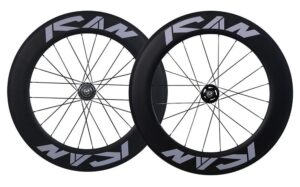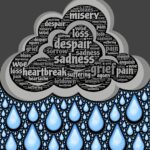In the first three articles in my series on the impact of emotions in triathlon, I introduced you to how emotions can be weapons or tools in our triathlon efforts, how to break the negative emotional chain, and how to ensure that you feel disappointment rather than devastation, respectively. In the final article in the series, I’ll explore how playing the victim role will not serve you well as you pursue your triathlon goals and how you can become an emotional master in your triathlon life (and beyond).
 A key message in this section is to convince you of the absolutely essential role that emotions play in your athletic life. Triathlon can evoke a wide range of emotions, from inspiration, pride, exhilaration, and satisfaction, to fear, frustration, anger, and disappointment, often in a very short time span during training or races. I emphasize the impact that emotions can have on you because it has been my experience that they ultimately dictate your ability to perform your best and achieve your triathlon goals. Your ability to train and race consistently well is often determined by the consistency of your emotions—as your emotions go, so go your performances—and your ability to master them. Your ability to respond positively to the inevitable challenges you will face in training and races are often impacted by your emotional reactions to those challenges. Because of this influence, your ability to master your emotions gives you the power to use emotions as tools to facilitate, rather than as weapons that hurt, your triathlon efforts.
A key message in this section is to convince you of the absolutely essential role that emotions play in your athletic life. Triathlon can evoke a wide range of emotions, from inspiration, pride, exhilaration, and satisfaction, to fear, frustration, anger, and disappointment, often in a very short time span during training or races. I emphasize the impact that emotions can have on you because it has been my experience that they ultimately dictate your ability to perform your best and achieve your triathlon goals. Your ability to train and race consistently well is often determined by the consistency of your emotions—as your emotions go, so go your performances—and your ability to master them. Your ability to respond positively to the inevitable challenges you will face in training and races are often impacted by your emotional reactions to those challenges. Because of this influence, your ability to master your emotions gives you the power to use emotions as tools to facilitate, rather than as weapons that hurt, your triathlon efforts.
 Emotions are simple, but not easy, choices. They are a simple choice because if you have the option to feel bad and perform poorly or feel good and perform well, you will certainly choose the latter option. However, emotions are not an easy choice because your hard-wired temperament, emotional obstacles, and old emotional habits can lead you down the bad emotional road that can cause you to respond emotionally in ways that are unhealthy and result in poor performance. The choice comes with awareness of when negative emotional reactions arise on your triathlon journey and choosing a positive emotional response that will lead to good feelings and successful performance.
Emotions are simple, but not easy, choices. They are a simple choice because if you have the option to feel bad and perform poorly or feel good and perform well, you will certainly choose the latter option. However, emotions are not an easy choice because your hard-wired temperament, emotional obstacles, and old emotional habits can lead you down the bad emotional road that can cause you to respond emotionally in ways that are unhealthy and result in poor performance. The choice comes with awareness of when negative emotional reactions arise on your triathlon journey and choosing a positive emotional response that will lead to good feelings and successful performance.
Emotional Victim
Many people believe that they are the way they are emotionally, have little control of their emotions, and there is nothing they can do to gain control of them. If their emotions hurt them, well, they just have to accept the situation because they can’t do anything about it. I call these people emotional victims, where their emotions control them, they don’t believe they can do anything about their emotions, they possess unhealthy and unproductive emotional habits, and their emotions hinder their ability to perform well and achieve their goals.
 Being an emotional victim in triathlon will leave you at the mercy of all of the challenges that you face in your triathlon life. Some of these difficulties include the pain of training, fear of crashing on the bike, demanding race conditions, and failure to achieve your triathlon goals, among many others. Additionally, the physical demands of triathlon, including fatigue and pain, can trigger unhealthy emotions such as helplessness and despair. The inability of emotional victims to constructively confront and overcome these challenges and the emotions that often come with them will almost certainly ensure that you don’t give your best effort in training and perform your best in races.
Being an emotional victim in triathlon will leave you at the mercy of all of the challenges that you face in your triathlon life. Some of these difficulties include the pain of training, fear of crashing on the bike, demanding race conditions, and failure to achieve your triathlon goals, among many others. Additionally, the physical demands of triathlon, including fatigue and pain, can trigger unhealthy emotions such as helplessness and despair. The inability of emotional victims to constructively confront and overcome these challenges and the emotions that often come with them will almost certainly ensure that you don’t give your best effort in training and perform your best in races.
Emotional Mastery
Despite your believing that you are an emotional victim, my work has clearly shown that you are capable of becoming an emotional master. You can gain control of your emotions. You can develop healthy and productive emotional habits. And your emotions can facilitate your ability to perform well and achieve your triathlon goals.
 Emotional mastery is not about not feeling, avoiding, or suppressing your emotions. The reality is that emotions are such powerful forces within us that, despite our best efforts to keep them inside, they always have a way of leaking out and hurting us in both subtle and obvious ways. You may experience a sense of anxiety before a race or you may feel absolutely disconsolate after a disappointing race.
Emotional mastery is not about not feeling, avoiding, or suppressing your emotions. The reality is that emotions are such powerful forces within us that, despite our best efforts to keep them inside, they always have a way of leaking out and hurting us in both subtle and obvious ways. You may experience a sense of anxiety before a race or you may feel absolutely disconsolate after a disappointing race.
Instead, emotional mastery involves allowing yourself to fully experience whatever emotions you feel, identifying what emotions are you feeling, understanding where they came from (both the external causes and the internal perceptions), and then expressing them in healthy ways that foster both performance and happiness. You should begin the process of emotional mastery by exploring your emotions retrospectively, meaning looking back at them after they’ve occurred, for example, after a workout or race when your emotions might have gotten the best of you.
Recognize your emotions. The process of emotional mastery begins with recognizing the negative emotional reactions that hurt your triathlon efforts. I’ve often found that people can tell me that they were feeling bad, but it was more difficult for them to specify the precise emotion they were feeling. When you feel negative emotions during training or a race, see if you can give them a label such as fear, frustration, anger, or despair.
 Identify the situation. Once you’ve recognized the specific emotions you felt, it’s useful to then identify what situation is causing them, for example, having a poor workout or running out of gas toward the end of a race. I’ve found that strong negative emotions tend to arise in characteristic situations. The obvious value of identifying the situation in which emotions arose in you is that you can predict when they are likely to occur in the future and create a plan for responding to them as an emotional master.
Identify the situation. Once you’ve recognized the specific emotions you felt, it’s useful to then identify what situation is causing them, for example, having a poor workout or running out of gas toward the end of a race. I’ve found that strong negative emotions tend to arise in characteristic situations. The obvious value of identifying the situation in which emotions arose in you is that you can predict when they are likely to occur in the future and create a plan for responding to them as an emotional master.
Understand your emotions. You can next reflect back to the situation in which the negative emotions arose and identify the underlying cause of the emotions. Perhaps your emotions arose out of a nutritional crisis during a long and hard workout. Or your perfectionism has caused you to beat yourself up for falling short of your goals in a training session. Understanding the cause of your emotions will enable you to choose the best means of either preventing them from occurring or addressing them in a healthy manner if they arise again.
Choose an alternative response. With the above information gathered, you can now specify alternative emotional reactions to the situations that commonly trigger negative emotions. For example, instead of yelling, “I am terrible!” after feeling frustrated after a poor performance in training, you could slap your thigh and say, “Come on, better next time!” which should generate positive emotions such as hope and determination. Or, instead of yelling at another triathlete who bumps you during the swim start of a race, you could tell yourself, “Contact is going to happen. Just keep swimming,” and focus on reestablishing your rhythm. These positive emotional responses will help you prevent or let go of the causes of the negative emotions, motivate you to keep working hard, generate positive emotions that will give you more confidence (because you’re not freaking out), and allow you to focus on what will help you raise the level of your efforts.
 Recognizing that emotional mastery is about developing emotional awareness and tools, this positive response will not be easy at first because your negative emotional habits are well ingrained; realize how difficult it is to change a bad technical habit! But, with commitment, awareness, control, and practice, and the realization that you feel better and your performances improve with a positive response, you will, in time, retrain your emotions into positive emotional habits. The result will be a transition from being an emotional victim to becoming an emotional master who now has the tools to not only perform much better, but also gain much more meaning, satisfaction, and joy from your triathlon experiences..
Recognizing that emotional mastery is about developing emotional awareness and tools, this positive response will not be easy at first because your negative emotional habits are well ingrained; realize how difficult it is to change a bad technical habit! But, with commitment, awareness, control, and practice, and the realization that you feel better and your performances improve with a positive response, you will, in time, retrain your emotions into positive emotional habits. The result will be a transition from being an emotional victim to becoming an emotional master who now has the tools to not only perform much better, but also gain much more meaning, satisfaction, and joy from your triathlon experiences..
Seek professional help. If the negative emotions you experience in your triathlon life are strong, persistent, and hurt you both in triathlon and in other parts of your life, you might consider seeking help from a sport psychologist or other qualified mental health professional. Such guidance can assist you in better understanding your emotional habits, how they may interfere with your triathlon efforts and your life, and how you can learn new emotional responses that will better serve you in our amazing sport and beyond.
Do you want to take the next step in training your mind to perform your best in training and on race day? Here are five options for you:
- Read my Triathlon blog.
- Listen to my Train Your Mind for Athletic Success
- Read my latest mental training book: Train Your Mind for Athletic Success: Mental Preparation to Achieve Your Sports Goals.
- Take a look at myonline mental training courses.
- Schedule a 1:1 session with me.







